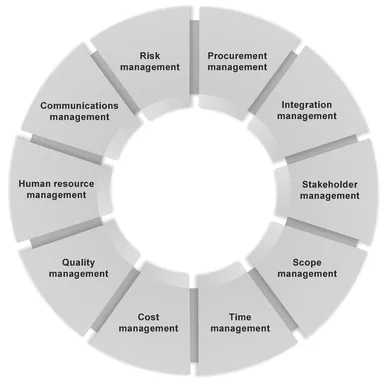
- 464 pages
- English
- ePUB (mobile friendly)
- Available on iOS & Android
About this book
Organisations increasingly look to project management to deal with short timeframes, tight budgets, changing requirements and risk management in everyday operations, as well as for major strategic projects. Project management knowledge and skills are now essential for professionals just about everywhere, from teachers, social workers and lawyers, to engineers, builders and accountants.
Stephen Hartley's Project Management is based on the recognised global standard for project management, the Project Management Body of Knowledge (PMBOK Guide), and it incorporates aspects of Agile, PRINCE2, Lean and other popular methodologies. It offers a thorough overview of the principles of project management, combined with tools and guidelines to manage projects of all sizes, from inception to evaluation.
Written in an accessible and engaging style, Stephen Hartley's widely used text has been fully revised and updated. It focuses on shared responsibility, transparent documentation, reporting achievement over activity, and continuous improvement. It is illustrated with examples and case studies, and accompanied by a suite of downloadable templates and tools.
'Stephen Hartley is without doubt Australia's leading authority on project management. This book is the bible for any current or future project manager.' - Dr Tim Baker, author of The End of the Performance Review
Information
Chapter 1
Project management

- ∎ What a project is and isn't
- ∎ Four interdependent project constraints
- ∎ Defining project management
- ∎ Comparing management and leadership
- ∎ Delegating by degrees
- ∎ Previewing four popular project management methodologies
- ∎ Navigating the project management life-cycle
- ∎ Factors behind project success and failure
- ∎ The Project Management Body of Knowledge (PMBOK)® knowledge areas
Chapter overview
- ∎ the constant cycle of change within which business operates
- ∎ time-poor business driven by tight (sometimes impossible) deadlines
- ∎ advances in technology
- ∎ the increasing influence of market pressures
- ∎ global competition and the need to remain competitive
- ∎ greater rates of (financial) return required
- ∎ higher degrees of transparency accountability and consistency
- ∎ an increased interest in measured outcomes (benefits accruing from the project)
- ∎ increased attention on legal and contractual obligations
- ∎ the need to deliver products or services meeting benchmarks, quality assurance or best-practice guidelines
- ∎ greater emphasis on businesses producing cost-effective solutions?
Table of contents
- Cover
- Title
- Copyright
- Dedication
- Contents
- List of tables and figures
- Acronyms and abbreviations
- About the author
- Preface
- Using this textbook
- Project management life-cycle on a page
- 1 Project management: An adaptable body of knowledge
- 2 Organisational capability: Emerging strategy, justification and capability
- 3 Stakeholder management: Strategies for continuous engagement
- 4 Scope management: Delivering on changing expectations
- 5 Time management: Developing and controlling the schedule
- 6 Cost management: Ending the reliance on the budget variance
- 7 Quality management: Achieving technical excellence and customer satisfaction
- 8 Human resource management: Developing and maintaining individual and team performance
- 9 Communications management: Matching intent with outcome
- 10 Risk management: Proactively managing uncertainty, complexity and change
- 11 Procurement management: Embedding value into the project
- 12 Integration management: Unifying a coordinated approach
- Appendix 1: Issue matrix
- Appendix 2: Linking theory and practice activities
- Appendix 3: Project management templates
- Glossary
- Bibliography
- Index
Frequently asked questions
- Essential is ideal for learners and professionals who enjoy exploring a wide range of subjects. Access the Essential Library with 800,000+ trusted titles and best-sellers across business, personal growth, and the humanities. Includes unlimited reading time and Standard Read Aloud voice.
- Complete: Perfect for advanced learners and researchers needing full, unrestricted access. Unlock 1.4M+ books across hundreds of subjects, including academic and specialized titles. The Complete Plan also includes advanced features like Premium Read Aloud and Research Assistant.
Please note we cannot support devices running on iOS 13 and Android 7 or earlier. Learn more about using the app